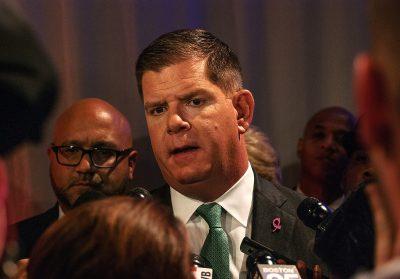Boston Mayor Martin Walsh received national recognition Thursday for his efforts to combat drug abuse in the city.
The Community Anti-Drug Coalitions of America presented him with its National Leadership Award at the organization’s 30th Annual National Leadership Forum.

CADCA, representing every U.S. state and territory as well as more than 30 countries, offered Walsh the award to honor his leadership in the prevention and treatment of drug use disorder throughout his decades in public service.
Walsh said in a statement that the issue of drug use disorder is personal for him.
“This award is especially meaningful to me because substance use disorder is something I’ve experienced,” Walsh said.
In his first term as mayor, Walsh created Boston’s Office of Recovery Services, the first in the country on a municipal level.
Through the office, the city has equipped its public safety vehicles with medication to reverse opioid overdoses and launched a 24-hour recovery services hotline, among other initiatives.
Maureen Cavanagh, founder and president of Magnolia New Beginnings, a Massachusetts-based support group for families affected by drug use disorder, said drug abuse is a state- and nationwide epidemic.
“It’s decreasing our lifespan and it’s killing our children and loved ones,” Cavanagh said. “And I don’t think I know anybody that hasn’t been affected by it in some way.”
Substance use disorder has been at crisis levels in the United States since the 1980s, Cavanagh said, and it hit the country’s middle-class suburbia about 10 years ago. She said a major contributor to the problem was addicts’ fear of speaking up.
“Because 20, 30 years ago, when somebody had an issue, they were arrested,” Cavanagh said. “And we’re not doing that anymore, thank God. We’re looking at the problem.”
Drug addiction, Cavanagh said, alters the brain structurally and functionally. Like any other disease, she said, substance use disorder can affect every aspect of a victim’s life.
“There’s probably many people that you know that currently have a substance use disorder that you have no idea, because they’re still holding it together,” Cavanagh said. “So there’s various stages of this disease, and all depending on what stage of the disease they’re in is what the effects will look like.”
Cavanagh said drug abuse prevention must start from youth: children should learn psychological flexibility early on, as well as be aware of any addiction issues that run in the family.
Communities should also take care, she said, to provide early and continuous help for drug use disorder victims.
“The big problem that we’re seeing is that there’s treatment, but there’s not long-term treatment,” Cavanagh said. “And this is unfortunately not something that can be taken care of in two weeks. It’s a disease that needs ongoing treatment.”
Cavanagh said local sufferers of substance addiction have many resources to turn to. Massachusetts provides detox services not available everywhere, and Boston offers its unique Providing Access to Treatment Centers For Addiction, Hope and Support program.
“We’re very, very, very lucky to be in Massachusetts,” Cavanagh said. “And the services in Boston in particular are really excellent. [But] we still have a long way to go.”
Cindy Chen, 25, of Fenway said she often notices the scent of smoked substances in the city.
“I can always smell the special smell,” Chen said. “It’s terrible here so I don’t really like it. Especially when you’re in the late evening and you work out as a female, I’m kind of worried sometimes.”
Gabrielle McCann, 25, of Brighton said while she does not keep up with local initiatives surrounding the matter, she does have family members and friends who suffer from drug use disorder.
“I definitely do think that there is a massive drug problem in regards to specifically narcotics, like Oxy and Percocet and all of that,” McCann said. “I knew a kid in high school and got addicted to Percocet. It was after having back surgery or something.”
Nicole Khoury, 21, of Back Bay said she does not personally know anyone affected by drug addiction, but that she supports having a local leader with experience in the issue.
“We need someone that has a really good background,” Khoury said, “that has [done] a lot of research and knows what they’re doing.”






















































































































